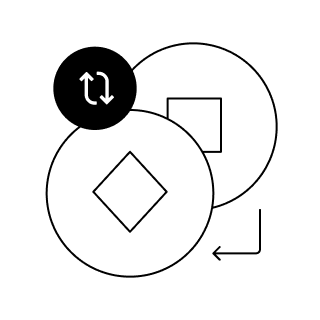How can I buy Guild of Guardians on OKX?
Whether you're new to crypto or an experienced trader, you can buy Guild of Guardians using the OKX Wallet or Exchange mobile apps, or right here on the web.

Step two
Fund your account
Deposit funds via bank transfer, credit card, or Apple Pay.

Step three
Choose Guild of Guardians
Select Guild of Guardians and buy using your chosen method.

Step four
Receive your Guild of Guardians
Confirm your purchase and store your Guild of Guardians in your portfolio.
Why should I buy Guild of Guardians on OKX?
Learn more about the security measures keeping your Guild of Guardians safe and readily available.
Proof of Reserves
Our 1:1 reserve ensures your funds will always be available to you.

High liquidity
Our high trading volumes mean deeper liquidity and smoother execution for you.
Transparency
We ensure historical market data is available to you at all times.
Security
We adhere to the strictest global security and compliance standards.

Learn more about how to buy Guild of Guardians (GOG)
DeFi vs CeFi vs CeDeFi: Comparison
Did you know that the total value locked in decentralized finance platforms soared past $50 billion in 2025? With explosive growth in cryptocurrency adoption, more users are asking the big question: D
How to Recover Crypto Password?
Every year, millions in crypto are stranded due to a lost or forgotten crypto password—but you don’t have to be one of them. Whether you’re struggling to sign in to your exchange account or can’t reme
Is CeDeFi Safe to Invest?
CeDeFi (Centralized Decentralized Finance) combines the efficiency of centralized platforms with the innovation and transparency of DeFi. In today’s rapidly evolving crypto landscape, understanding ce
Layer 2 in Crypto: Beginner’s Guide to Fast and Cheap Transactions
Did you know Layer 2 solutions can lower your crypto transaction costs by over 90% and make transfers nearly instant? Whether you’re trading Ethereum or using DeFi apps, “layer 2” is the secret behind
How to get Guild of Guardians for free
Invite friends, earn rewards
See how you can get free Guild of Guardians when you invite friends to trade with you.
Earn APY on your crypto
Earn interest down to every dollar and watch your Guild of Guardians grow, for free. Put your crypto to work, 24/7.
Join airdrop campaigns
You can get free Guild of Guardians airdropped to you when you join campaigns.
See what you can do with your crypto
Now that you’ve mastered the art of buying crypto, check out its potential.

Trade Guild of Guardians
Take advantage of price fluctuations and trade your Guild of Guardians for other cryptocurrencies.

Send Guild of Guardians
Send your Guild of Guardians anywhere, anytime with fast, low-cost transfers.

Spend Guild of Guardians
Use your Guild of Guardians to pay for goods, services, and experiences seamlessly.

Hold Guild of Guardians
If you think your Guild of Guardians will increase in value, you can hold onto it.

Sell Guild of Guardians
Convert your Guild of Guardians to cash quickly and securely.
How to buy Guild of Guardians (GOG) FAQ
Depending on where you’re located, you can use bank transfer, credit/debit card, or Peer-to-Peer. Read our guide on how to use these different payment methods to buy Guild of Guardians GOG safely on a trusted exchange like OKX.
Choose the best exchange to buy Guild of Guardians (GOG) depending on your individual needs. Factors to consider when picking the best place to buy Guild of Guardians (GOG) include: security measures, platform transparency, fees, and efficient transaction processes. First-time beginners can consider trusted exchanges such as OKX.
Countries and regions differ on how digital assets transactions and holdings are taxed and how they view digital assets in general (money, property, commodity). In general, it is expected that you will pay capital gains tax when selling or swapping Guild of Guardians. Refer here for a more detailed guide.
There are exchanges that offer users privacy and do not require verification to complete transactions. However, it is important to exercise caution as such exchanges might be more prone to fraud.
Use a trusted, centralized exchange such as OKX, which offers the ability to buy and sell Guild of Guardians (GOG), as well as fiat withdrawal options.
This depends on the method you use to convert Guild of Guardians (GOG) to cash. Withdrawals to a bank can take one to three working days to process, while withdrawals to a debit card can be almost instantaneous.
Disclaimer
This is provided for informational purposes only. It is not intended to provide (i) investment advice or an investment recommendation, (ii) an offer, solicitation, or inducement to buy, sell or hold digital assets, or (iii) financial, accounting, legal or tax advice. Digital assets, including stablecoins and NFTs, are subject to market volatility, involve a high degree of risk, and can lose value. You should carefully consider whether trading or holding digital assets is suitable for you in light of your financial condition and risk tolerance. Please consult your legal/tax/investment professional for questions about your specific circumstances. Not all products are offered in all regions. For more details, please refer to the OKX Terms of Use and Risk Warning. OKX Web3 Wallet and its ancillary services are subject to separate Terms of Service.
You are viewing content that has been summarized by AI. Please be aware that the information provided may not be accurate, complete, or up-to-date. This information is not (i) investment advice or an investment recommendation, (ii) an offer, solicitation, or inducement to buy, sell or hold digital assets, or (iii) financial, accounting, legal or tax advice. Digital assets are subject to market volatility, involve a high degree of risk, and can lose value. You should carefully consider whether trading or holding digital assets is suitable for you in light of your financial condition and risk tolerance. Please consult your legal/tax/investment professional for questions about your specific circumstances.
You are viewing content that has been summarized by AI. Please be aware that the information provided may not be accurate, complete, or up-to-date. This information is not (i) investment advice or an investment recommendation, (ii) an offer, solicitation, or inducement to buy, sell or hold digital assets, or (iii) financial, accounting, legal or tax advice. Digital assets are subject to market volatility, involve a high degree of risk, and can lose value. You should carefully consider whether trading or holding digital assets is suitable for you in light of your financial condition and risk tolerance. Please consult your legal/tax/investment professional for questions about your specific circumstances.






















